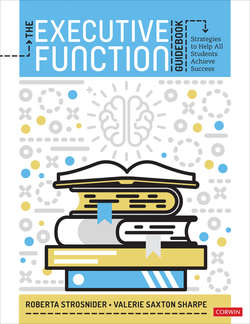Читать книгу The Executive Function Guidebook - Roberta Strosnider - Страница 38
На сайте Литреса книга снята с продажи.
How Does a Difficulty in Working Memory Impact Student Achievement?
ОглавлениеStudents who have difficulty in working memory face numerous challenges in the classroom. Moyes (2014) reminds us that our students in general forget 90 percent of what they learned within the first thirty days and much of it soon after class ends. If we want them to remember, we need to repeat information often (p. 66). It is helpful if that information is repeated in different ways. Students with working memory problems face even larger hurdles, and many benefit from learning that involves sensory activities. This can be accomplished with learning letters by saying the letter, tracing the letter, and making the letters in sand. This is a multisensory approach that can have a positive influence on memory.
Kaufman (2010) states, “Given the dramatic impact that comparatively weak working memory can have on academic functioning, it is important that instruction be delivered in ways that minimize amount of information (e.g., directions, content) students with working memory problems must hold at any one time on their smallish ‘cognitive desktops’” (p. 84).
The behavior and social/emotional well-being of a student may also be impacted by a deficit in working memory. In school, when a student has difficulty remembering rules and procedures, it may appear the student is not trying or is purposefully not complying with the rules and procedures of the classroom. This inability to remember rules and procedures may cause the student to feel anxious and confused about how to respond. Without intervention and specific strategies to help with working memory, the child may fall into a downward spiral of behavioral and social/emotional issues. According to Moyes (2014), it is important to consider the student’s struggle with working memory and reward remembering while not punishing forgetting. We go a step further and advocate rewarding the appropriate use of strategies also.
In addition, a working memory deficit has social/emotional implications beyond the academic setting. If not sufficiently addressed in school, a working memory deficit may impact a person throughout his or her lifetime. Each day, a person with a working memory deficit struggles to remember tasks that need to be completed in the home and work settings, as well as important events and meetings, dates and times for medical appointments, social gatherings, and the like. The inability to remember this kind of important information can result in the loss of jobs and friendships, leaving the person with feelings of failure, low self-esteem, loneliness, and frustration.
